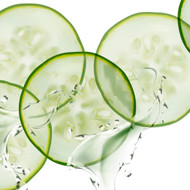Introducing our New Natural Signature Scents - Forest Path and Cucumber Waters
Posted by Dee Dee Mares on Oct 08, 2023
While many people prefer or must use unscented personal care products, others would enjoy a hint of something to uplift their mood or remind them of soothing places or spa-like experiences. We have found two natural scent blends that will do just that.

Our Bath and Body Care Line (Songline Body Wash and Songline Body Silk), continues to come in an unscented version but now offers a Natural Forest Path Scent option.
This scent starts with essential oils of cedarwood, oakmoss, neroli, lavender, and bergamot with an uplift of lemon, orange, and lime. Then, isolated aromatic compounds from bay leaf, amber, and tobacco add an enticing layer of woodlands. Close your eyes, breathe deep, and experience the joys of Forest Bathing.

Our Face Care Line (Songline Emu Oil and Goat Milk Bar Soap, Songline Face Polish Scrub, and Songline Face Cream) now offers a Natural Cucumber Waters Scent. It contains essential oils of cucumber seed, lemon, orange, and geranium with added notes of rose, water lily, jasmine, musk, cypress, and moss. This scent will bring the feeling of spa-like treatments to your day.
Both fragrances are light, do not linger, and are meant to be enjoyed in the moment. They are appropriate for all genders.
About Synthetic Fragrances
There are different types of synthetic fragrances. Full synthetics are made almost entirely from petroleum byproducts and semi-synthetics containing synthetic and natural materials. Synthetic fragrances have been popular in products because they last longer, are cheaper to produce, and are more consistent from batch to batch than natural fragrances.
However, studies have shown that some fragrance ingredients can be potentially hazardous or toxic. Phthalates are a common fragrance ingredient that may be cause for concern. Diethyl phthalate, the one most used, has been linked to hormone disruption and developmental disorders, particularly in newborn males.
Moreover, because synthetic fragrances last long, they remain on the skin, body, and atmosphere for many days or weeks. One of the significant issues with synthetic fragrances is that they are virtually everywhere. Laundry detergents, soaps, hand sanitizers, body lotions, deodorants, shampoos and conditioners, dishwashing liquid, air fresheners, and fabric softeners all contain synthetic fragrances. This over-exposure to synthetic chemicals has led many people to develop allergies and is also responsible for how difficult it is for those with allergies to avoid these scents.
How Are Natural Fragrances Different?
Natural Fragrances are formulated entirely from natural materials, essential oils, resins and gums, and aromatic isolates.
Many begin as a blend of essential oils - concentrated liquids extracted from plants that capture their complete aromatic compounds and natural essence. The most common methods of extracting these oils are:
Steam Distillation: Plant material is placed in a distillation chamber, passing steam through it. The steam causes the essential oil glands in the plant material to burst, releasing the volatile aromatic compounds. The steam and essential oil vapor are condensed and collected, with the essential oil floating on top of the water. The oil is then separated from the water, producing pure essential oil.
Cold Press Extraction: This method is primarily used for citrus fruits like oranges, lemons, and grapefruits. The oil is extracted by mechanically pressing or crushing the fruit peels, which releases the essential oil. The oil is then separated from the juice and other components.
What are Isolates?
Not all plants produce significant amounts of essential oils or lack the specialized structures to store and release them. However, some plants may still contain trace amounts of volatile compounds contributing to their aroma or flavor. Using a lab technique called chromatography, these individual compounds can be separated out.
This is especially helpful because the natural aromatic molecules in some plants like Apples and Strawberries cannot be effectively distilled by steam or water, and other plants like roses would require such an enormous amount of botanical material that the cost is far too high.
Next, that isolate can be blended with others and full essential oils. Linalyl acetate from lavender, which has a floral and citrusy scent, could be blended with ethyl acetate from orange, which smells sweet and fruity. These blends lead to more complex, exciting scents without the sensitivity triggers that can come with synthetic fragrances.
That said, some people still might find that they react to any concentration of scents (synthetic or natural), but this does open the way for others to bring the joy of scent back into their lives.

